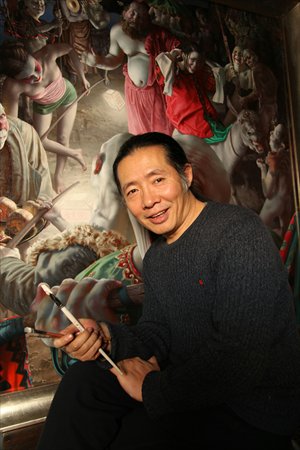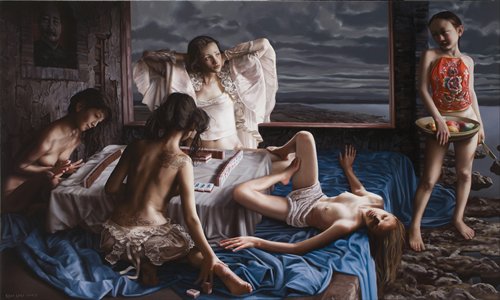Erotic echoes


It was the dynamic of the scantily clad girls positioned around the small mahjong table rather than the nudity which sparked intense debate after the politically suggestive oil painting 2008 Beijing debuted in New York on March 6, 2005.
An American collector bought the painting for a tiny fraction of the eventual 19-million yuan ($3 million) auction price last December. Now in the hands of a Chinese collector, it was at one point third only to Da Vinci's Mona Lisa and Van Gogh's Starry Night as most-searched painting online.
The work is by Chinese-Canadian artist Liu Yi, 56, who was born in Tianjin but emigrated to Toronto, Canada, in 1991. Liu and wife Zheng Min have since moved back to Beijing where Liu now spends 14-hour days in his Wangjing studio.
Some deemed 2008 Beijing too erotic. Others tried their best to decode its cultural and political meaning.
The group of semi-naked women is apparently playing mahjong. One is said to be American; she appears bold and confident. Another is thought to be Russian; she lies topless on her back with her right foot on the American's left thigh. In the foreground, a tattooed woman, possibly Chinese, sits facing away.
"The painting is talking about who the rule-maker is," says Liu in a recent interview with Metropolitan, when attempting to convey the meaning of his work.
"Mahjong is a Chinese game. It's very confusing for Western people. The game represents the political situation between countries around the world."
Standing waif-like, away from the table, a prepubescent girl said to be Taiwanese, wearing only a backless red top, cradles a bowl of fruit in front of her crotch.
On the left is a short-haired woman who is thought to be Japanese. She is naked and seems to be lost in thought; perhaps contemplating her next move.
"It's the national mentally of the Chinese to presume that she's Japanese," Liu says.
Further analysis was heaped on another of Liu's works entitled Girls Playing Mahjong. The two works are almost identical except for the "Japanese" woman (still on the left) who looks directly at the alleged Chinese with a manic expression of joy on her face. Her hair is frizzled and messy.
"He wanted the painting to be collected by a Chinese collector," Liu's wife Zheng Min interjects over the speakerphone. Liu picks up the conversation: "One girl was changed that was obviously different. In the first one everyone thought it was a Japanese - I don't want people to see it as just Japanese."
Now in the ownership of an undisclosed private collector somewhere in Southeast Asia, Girls Playing Mahjong was sold at auction for an estimated 1.881 million yuan in November 2006, a price notable Chinese art collector Tang Ju, 49, theorizes is too much.
"I know there are some political interpretations behind this painting. I don't see any in either of the paintings," says Tang.
The artist himself says he has no political agenda and states that a good painting is one that tells a story well. Would he change anything further between the perceived Japanese and Chinese in the painting should he get commissioned to do it again?
"This painting is not involved in any particular event. I don't think I would do that kind of change," he says with an air of ambiguity.